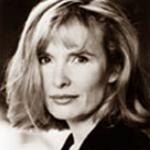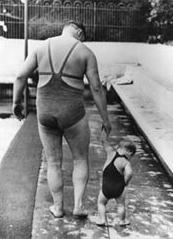
Lindsay Duncan Interview
with Mobil Masterpiece Theatre

How would you describe Shooting the Past? Is it a mystery, a drama? There's a bit of comedy in the film as well.
I think that's one of its strengths -- it is difficult to label. It's very refreshing in that respect. It's just a very good story. To call it a thriller would be to exaggerate grossly the sense of suspense that's definitely there. I mean, I think as in all good stories, you meet some people in certain situations, and if it's sufficiently engaging, you want to know what happens next. I think that's what happens in Shooting the Past.
Stephen has certainly written some interesting characters. Quite an odd bunch of people. And they're all different, aren't they, from each other. They're very different. I think that's engaging. You start to feel that you know them. I think he does the characters terribly well. You've got conflict, the absolutely classic ingredient. And then, you know, you have the interest of watching that conflict be addressed. And well, who knows? Resolved.
What appealed to you specifically about your character, Marilyn Truman? Who is Marilyn Truman?
Well, you know as an actress you read a script of that quality...that's your starting point. I'm always interested in the whole, you know? I was just very taken by the quality of the writing and storytelling. I just loved the whole thing. But you know, Marilyn is certainly someone who is interesting to play -- she's a strong woman, she's an opinionated woman, she's a woman with a passion, and that passion is her work. And she is a woman who's not invested heavily in her personal life.
The challenge there is not to make her unsympathetic. I think you see all the main characters in Shooting the Past as fairly rounded human beings. At any given moment you might be sympathetic towards one of them, and then, you know, the next minute you could think, "God, they're irritating!" [LAUGHTER] I do love that. Stephen manages to show these people as complex human beings, and not to just offer the simplistic route through a story, making key characters really likable all the time.
These characters are unique. You see them being difficult. You certainly see Marilyn being difficult. But, as I said, she's got lots of...ingredients in her make-up that make her an interesting woman, a feisty woman, and a woman who cares very deeply.
You know, there's no conventional love interest in this. Again, that's very unusual. There's so much formulaic drama -- there has to be action, there has to be sex, or something grossly sentimental. A confident, skilled writer doesn't need to use those things to tell a story. Although, of course we're all fascinated by sexual relationships and, you know, not me particularly, but of course the thrills and spills of an action movie. But you don't need them if you have something to say, and if you can write rounded characters, which I think Stephen did. You know, Marilyn and Oswald are quite tricky people. I mean, you wouldn't always be comfortable in their company. But at the same time, you do feel for them deeply. To some extent that comes from the playing of the parts, but it's also there in the writing. These are people who feel very deeply, and stand by what they feel, even when it's an uncomfortable position to take.
The last line in the film is about change...both Marilyn and Oswald change considerably from the beginning to the end. Marilyn starts out quite stern at the beginning.
Yes. She is that. I mean, that's her way to keep her feelings to herself, and run a tight ship. Her standards are very high, and she won't have any nonsense. That's her way of keeping herself together. But always, always there is a woman who's capable of deep feelings. They emerge during the story, particularly in relation to Oswald, when she realizes at a profound level how much she values him as a human being, and she has to learn to show a little emotion. And the Oswald we see at the end is still probably playing the little games that he wanted to play, which are kind of hard to deal with. They're both a couple of oddballs, really, who don't fit neatly into a category.
What they share is their love of that photographic collection and their passionate interest in connections that are made, in this case, through photographs, in history. They're both very bright. I suppose she's a kind of a classic blue stocking, really. You know, she would have done rather well academically, and probably not been able to fit easily into a larger organization, so this suits her very well, to be running this small, but important collection. He, of course, is absolutely hopeless. [LAUGHTER]
It's an important point to make that people can't just be invalidated, eradicated, because they don't fit tidily into a box. And more and more, the modern world is all about conformity. I think the opportunity to get to know these difficult, spike-heeled, irritating people, and realize that they both have great value as human beings is a very important part of the story.
What was it like working with all of these photographs around you?
Oh, it was just as you'd expect, really in between takes we were all just rifling through the photographs whenever we had an opportunity. The really precious photographs were literally locked up and brought out carefully for filming of certain scenes. But nevertheless, there were stacks and stacks of photographs there. And we were all fascinated by them. We really were spoilt for choice. We just didn't know where to look. It was interesting...of course, that doesn't always happen when you're filming. We were as interested in them as all the characters were. The pictures are used in the telling of the story, and used, I think, to great effect.
I love the idea of a camera -- taking moving pictures -- looking at stills...the different ways of capturing images, you know, one moving, one frozen. I thought it was great, but then I think it's a very layered piece of writing. There's a great deal going on, but it's done so skillfully that you don't find it onerous. You're quite gripped by it, I think.
Many photographic archives are hidden away and people aren't aware of them ...will this make people more aware perhaps of the importance of saving old photographs?
I suppose that you have to know what you're preserving. There has to be a relationship, which means we have to make the connection between the past, the present and the future, and we can't do it mindlessly. We can't preserve absolutely everything! [LAUGHTER] You have to think carefully about why you preserve things ...I think the film does raise those issues in a gripping way.
You know, in England we have a rather worrying obsession with the past ... We do have a fantastic history, a very small country that has achieved a great deal ...We have some absolutely dazzling artifacts, architecture, whatever else, but you know ...when it becomes just a sort of recreational activity, just sort of mooch around old bits of England, or so ...tawdry! [LAUGHTER]. Tawdry old thatched cottages, or something, you know, models. You think, what are we doing here? What's the point? It doesn't make any connection. I don't know what it is. It's something -- that kind of coziness about, "Ooh, wasn't the past lovely?" Well, the past wasn't lovely, and you know nothing is ever just lovely. Everything is complicated. That kind of creaming off the pretty postcard image of the past, I think, is a road to nowhere.
The photographs that you see in Shooting the Past range from very serious and tragic to very funny and light...
Absolutely ...people making jokes with the camera, which is delightful. Everything is there -- everything that's happened in the 20th century, and that means not just great historical events and political events, all of which are very important, but those tiny human moments. You know, things like -- like this huge, huge man with a little toddler, in their swimming costumes. [LAUGHTER]. One tiny bottom, and one big one, and one big hand and a little hand ... these are the images which just go to some place inside you, to a human bit of you ...I'm sure it makes everyone think about their own photographic collections.

What's coming up for you next?
I'll be doing a double bill of Harold Pinter's work in London, it's Harold Pinter's 70th birthday, and I'll be doing his first play, and his latest play. Both directed by him.
Do you prefer film or stage?
Well, it's easier for me to have access to more really good work in the theatre. I've been really lucky to work with people like Stephen on television, he has done some of our best writing for television over many years. I've just completed an adaptation of Oliver Twist. I have done some wonderful television, but you know there's not as much exceptional material as there is in the theatre. So I do a lot of theatre, but really, as with most actors, I just love going from one to another. It's stimulating, it's diverting, it's a different way of life, and you know I dearly like a good mix [LAUGHTER]. I also have a film, Mansfield Park, directed by a wonderful Canadian director, Patricia Rozema. I think that should be coming out in the States soon